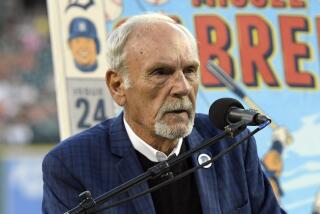Dick Williams dies at 82; old-school manager won back-to-back World Series with the Oakland A’s
Dick Williams, a feisty old-school baseball manager who won pennants with three teams and back-to-back World Series titles with the Oakland Athletics during a Hall of Fame career, died Thursday of a ruptured aortic aneurysm at a hospital near his home in Henderson, Nev. He was 82.
FOR THE RECORD: The news obituary for Hall of Fame manager Dick Williams in the July 8 LATExtra section said that when he led the Boston Red Sox to the 1967 World Series, it had been 31 years since their last appearance in the Series. The Red Sox had last played in the World Series in 1946, making it 21 years.
Williams spent more than six decades in professional baseball, signing with the Brooklyn Dodgers on the day he graduated from Pasadena High School in 1947. He made his major league debut four years later and eventually played six positions for five teams over parts of 13 seasons, batting .260.
But it was during his 21 years as a manager that he made his mark, earning enshrinement in the Hall of Fame in 2008.
As a rookie manager in 1967 — two seasons after he retired as a player — the 38-year-old Williams took the Boston Red Sox, who had finished ninth in the 10-team American League the previous two seasons, to their first World Series in 31 years.
Yet despite posting winning records in each of the next two seasons, Williams’ running battle with Red Sox superstar Carl Yastrzemski cost him his job with nine games remaining on the 1969 schedule.
Yastrzemski later called Williams “one of the best managers I ever played for,” starting a trend that would repeat itself throughout Williams’ career. Three times he used his hard-nosed, take-no-prisoners approach to turn teams around — and at least that many times, that approach got him fired.
“I was stern but fair,” was how Williams described himself. “If some guys couldn’t stand the heat, then they didn’t belong in the major leagues. I don’t know anybody who refused the World Series checks I helped them get.”
The season after Williams was fired in Boston, flamboyant owner Charlie Finley brought him to Oakland to manage the A’s. And though Finley and Williams battled incessantly, the next three seasons probably marked the high point of both men’s baseball careers.
Under Williams the A’s won more than 60% of their games and captured two World Series crowns, only to see the manager walk away to avoid being fired.
“It’s like a man and woman being married three years,” Williams said at the time. “When the woman finally gets on your nerves so much you can’t stand it, you get a divorce. Charlie and I are divorced.”
After managing the Angels through parts of three dreadful seasons, Williams went to Montreal, where he finished first or second in his division three times in five seasons, before returning home to Southern California to manage the San Diego Padres. He finished his managerial career in Seattle before retiring in 1988.
“He was a fiery-type guy that I thought could bring some stability to the franchise and bring a culture change,” said current Florida Marlins Manager Jack McKeon, who as the general manager in San Diego headed a team that had never finished with a winning record.
In four years under Williams, the Padres never had a losing season. And when they won their first pennant in 1984, it made Williams just the fifth manager to take teams from both leagues to a World Series.
“It was all business on Dick’s side. Absolutely no nonsense,” said relief pitcher Goose Gossage, who earned the save in the Padres’ pennant-clinching win over the Chicago Cubs. “What you saw is what you got, and that’s what I loved about Dick.”
Andre Dawson, who played five seasons under Williams in Montreal, said Williams is one of his favorite managers.
“I was young when he came over to Montreal … and he had that presence about him,” said Dawson, who visited with Williams two weeks ago at a Hall of Fame event. “The tag [was] that he didn’t have a lot of patience and he could be tough on a young ballclub. But he never had to call me into his office.
“He only said to me once, ‘Enjoy yourself. Play the game hard. Don’t disrespect the fans. And just let your ability guide you.’ For me, that was someone telling me to just go out and have fun.”
Times columnist Bill Plaschke, who covered Williams during his San Diego years and later co-wrote the manager’s 1990 memoir “No More Mr. Nice Guy,” also found Williams to be stern but fair — and far different than advertised.
When Plaschke gave Williams a first draft of the book’s damning warts-and-all manuscript, he braced for a fight. What he got was not the fight he anticipated, though. Rather than ask for retractions, Williams insisted on adding more of the harsher truths.
“He’s the only person I’ve ever seen to whom honesty was so important, he didn’t mind making himself look bad to some people as long as he told the truth,” Plaschke said.
Yet three years ago, when the hard-nosed, no-nonsense manager got the call informing him the Veterans Committee had elected him to the Hall of Fame, he and his wife Norma, who had been sitting with him by the phone, broke down and cried.
Williams, who was born May 7, 1929, in St. Louis, is survived by his wife; sons Rick — a scout with the New York Yankees — and Marc; daughter Kathi; and five grandchildren.
Funeral services will not be held, the family said.
More to Read
Start your day right
Sign up for Essential California for the L.A. Times biggest news, features and recommendations in your inbox six days a week.
You may occasionally receive promotional content from the Los Angeles Times.





















































